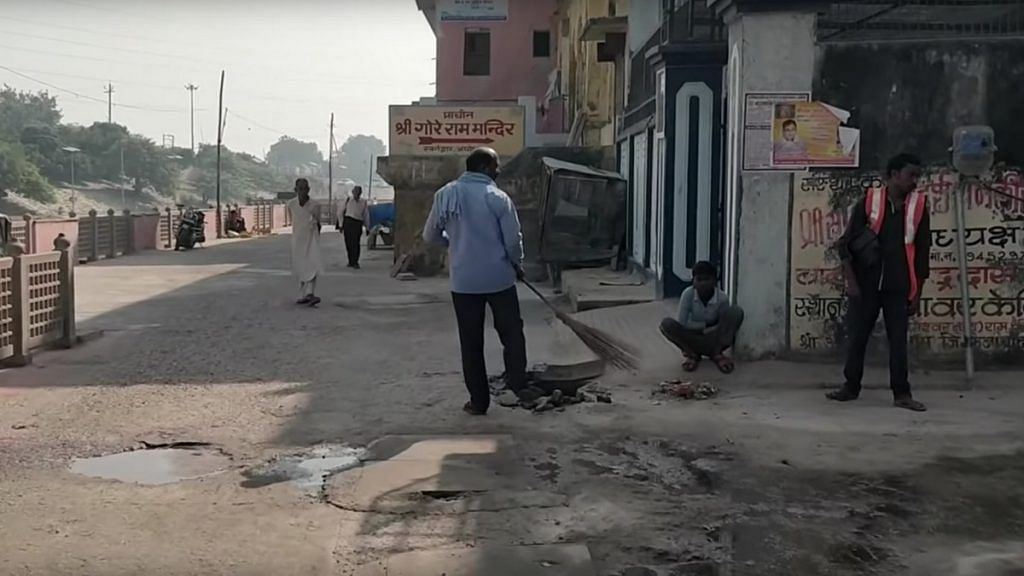In his address to the nation Tuesday, Prime Minister Narendra Modi extended the nationwide lockdown till 3 May and urged people to respect the Covid-19 ‘warriors’, which includes sanitation workers or safai karamcharis.
Since the coronavirus outbreak, the safai karamcharis who are regarded as essential workers have been hailed, especially on social media to celebrate them for the work they do.
Way to go Shambala Ji , I pray that people must have learnt to have higher value system by being grateful to all those who are working to keep the city clean. My heartfelt gratitude to the safai Karamcharis ?? https://t.co/jevAyWu2yl
— Meenakashi Lekhi (@M_Lekhi) April 9, 2020
This sudden outpouring of care and respect for the downtrodden and neglected doesn’t come natural to us. In normal times, we wouldn’t even bother to look at them. For us, they are all part of a ‘crowd’ which doesn’t have a face or identity. We want them, and we realise that only now, but would never want to become them.
Also read: Waiting for food, dodging cops — ragpickers in Lucknow slum live on crumbs, no water
Gandhi vs Ambedkar
Let’s face it. It took a global pandemic, a 21-day lockdown and over 300 deaths for us to acknowledge their work. But merely hailing and clapping them for their work, without questioning and dismantling the inherent casteist structures is an easy cop out. Wait, that will be actually a very Gandhian thing to do. Something B. R. Ambedkar fought against all his life with Gandhi.
During the independence movement, Gandhi would sweep his ashram and say cleanliness is godliness. But he didn’t work hard enough to look at the Hindu structures that kept caste alive and that kept Dalits (he called them Harijans back then) pinned to the same occupations for centuries.
The coronavirus pandemic is apocalyptic, some say. But it is also an opportunity that must not be wasted. Such windows come very rarely in our society when we actually give dignity to labour. Covid-19 has opened a small window for us to look at this profession and the people behind it.
Also read: Lockdown extended across India until 3 May, PM Modi says adequate stock of food, medicines
Deep-rooted biases
But look at what happened in Kushinagar in Uttar Pradesh. A man refused to eat the food at the quarantine centre because it was cooked by a Dalit. This incident highlights the real problem and why we are still decades away from celebrating them and understanding their work and lives.
We live in a world of convenience, and with convenience. We have a mask for every occasion that we pull out when required. This one, it seems, is cut out for the pandemic.
Also read: Ambedkar took on Brahmins in Indian media for their loyalty to the Congress party
Dalits and manual scavenging
On Ambedkar Jayanti, here are some points I want to ponder over.
Why are a disproportionate number of Dalits engaged in sanitation and cleaning work? It surely can’t be a coincidence. Activist Bezwada Wilson, who comes from a family of manual scavengers, was told by an employment exchange officer that “even if you have a PhD in rocket science, you will still not get a job… except as a safai karamchari.” The incident inspired Wilson to start the Safai Karmachari Andolan.
Even in their work as safai karamcharis, there is not adequate supply of protective gear and sanitation workers in Jharkhand are facing issues related to wages and distribution of rations.
7/ Mumbai’s safai karamcharis on the frontlines of the battle against Covid-19 continue to clear garbage with little protective gear & delayed wages.
“Risking our life is not new for us. We are here in this garbage everyday but will people think about us?”https://t.co/8GZ0VLisbW— The People's Archive of Rural India (@PARInetwork) April 7, 2020
Though India banned manual scavenging by law in 1993, the reality is that the practice is still prevalent across the country and continues to claim lives.
When we talk about Swachh Bharat, manual scavenging and the caste-based allocation of work, is conveniently forgotten. Cleaning feet, distributing saris and food is great for optics but coronavirus should help us go beyond these.
Jetty Umeshwar Rao, social Activist, in appreciation of Safai Karamcharis good services at the critical situation bring faced by the country in particular and the whole world as a whole, we have distributed about 40 sares and Rs.500/- each and fruits at Picket Cantonment sec-bad. pic.twitter.com/4LdNe1VnO2
— Jetty Umeshwar Rao (@UmeshwarRao) April 9, 2020
The pandemic has allowed us to look at doctors, nurses, the neighbourhood grocery store, sanitation workers and millions of domestic workers with a new lens of gratitude. Ambekdar would have liked us to go a little beyond gratitude too.
Views are personal.
